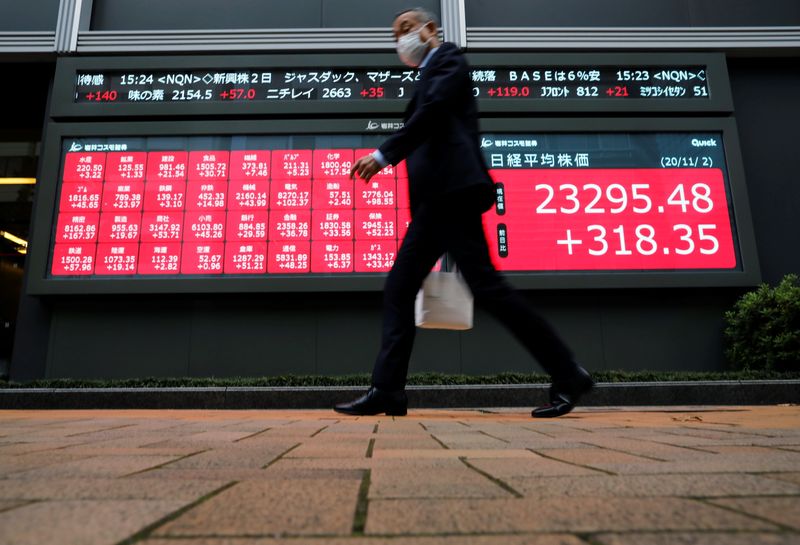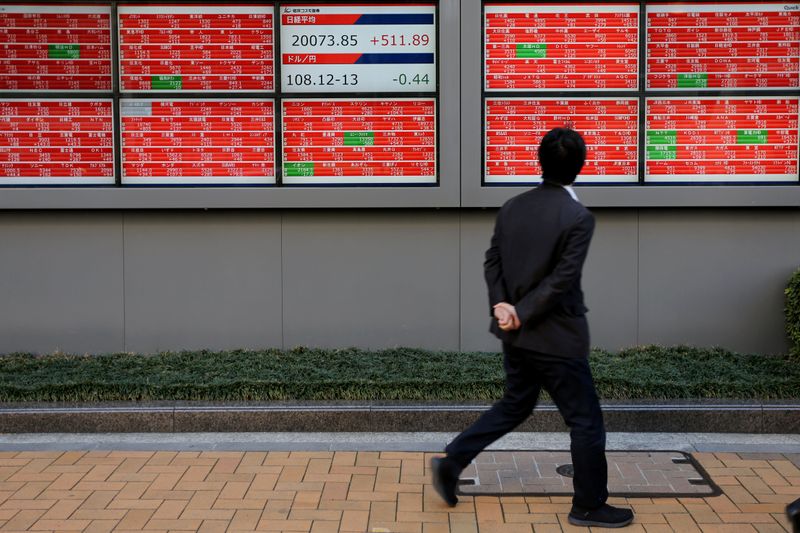By Tom Wilson and Tom Westbrook
LONDON/SYDNEY (Reuters) - Stocks gained and bonds dropped on Wednesday as news of a working COVID-19 vaccine outweighed worries over surging infections, fuelling rotation towards cut-price losers from the coronavirus pandemic such as travel stocks.
The broad Euro STOXX 600 climbed 0.4%, adding to a 5% rally this week and adding to 0.1% gains for Asia-Pacific shares outside Japan. Wall Street futures gauges also climbed, with S&P 500 futures up 0.3%.
Much of the action was switching between stocks as investors sold coronavirus winners to buy beaten-down equities.
Travel-related stocks gained 1.1%, while tech companies - which along with U.S. counterparts have surged since the coronavirus-driven crash in March - fell 0.5%.
Bonds also adjusted to the prospect of a post-pandemic world, with the yield on German Bunds, a benchmark for euro zone sovereign debt, rising to their highest for two months at -0.456%.
The yield on benchmark 10-year U.S. Treasuries posted on Tuesday its highest close since March, though U.S. bond markets are shut on Wednesday. Bond yields rise when prices fall.
"The market is not wrong - we know who benefited during COVID, and it was almost inevitable that if COVID comes to an end, you would have a reversal on that," said Luca Paolini, chief strategist at Pictet Asset Management.
The MSCI world equity index, which tracks shares in almost 50 countries, gained 0.1%, putting it not far from its record high touched on Monday.
Investors have pivoted to riskier plays in equities, foreign exchange and bonds after Pfizer Inc (NYSE:PFE) said on Monday its COVID-19 vaccine candidate, developed with BioNTech, showed a 90% success rate in preventing infection during trials.
Nearly $2 trillion changed hands on Monday alone, one of the heaviest trading days since the height of the pandemic crisis. Tech stocks, among the major winners in the pandemic, have lost out, as have safe haven currencies like the Japanese yen.
"You have seen a big rotation which highlighted how skewed positioning was, as people sheltered in the work-from-home plays," said Richard Saldanha, a portfolio manager at Aviva (LON:AV) Investors.
"For names geared towards so-called normalisation of activity, (the rally) could continue to play out in coming days."
Oil futures crept to new two-month highs on a sharp draw-down in supplies and anticipation of better demand in a post-pandemic world.
Brent crude futures climbed more than $1 a barrel to $44.71 a barrel, just below a two-month high touched earlier in the session.
VACCINATE, ROTATE
A rotation of sorts is also underway in fixed income markets, as bonds in Japan, South Korea, Singapore and Thailand fell while riskier bonds in higher-paying countries like Indonesia held gains.
New Zealand bonds crumbled as traders swiftly re-priced a much lower likelihood of negative rates, lifting the 10-year yield by 14.5 basis points to 0.898%, the steepest one-day rise since panic selling in March.
In currency markets, the kiwi dollar leapt nearly 1% to a 19-month high of $0.6903 after the Reserve Bank of New Zealand kept rates on hold, as expected.
The euro paused at $1.1820 ahead of a speech from European Central Bank President Christine Lagarde at 1300 GMT.
The dollar fell 0.2% against the Japanese yen, though it steadied against a basket of six major currencies, last trading at 92.741.
Graphic - Global assets: http://fingfx.thomsonreuters.com/gfx/rngs/COMMODITIES-ASSETS/010031B62XZ/index.html
Graphic - Global currencies vs. dollar: http://fingfx.thomsonreuters.com/gfx/rngs/GLOBAL-CURRENCIES-PERFORMANCE/0100301V041/index.html
Graphic - Emerging markets: http://fingfx.thomsonreuters.com/gfx/rngs/WORLD-ECONOMY/0100315T2M2/index.html

Graphic - MSCI All Country Wolrd Index Market Cap: http://fingfx.thomsonreuters.com/gfx/rngs/GLOBAL-MARKETS/010060TL1KC/index.html
